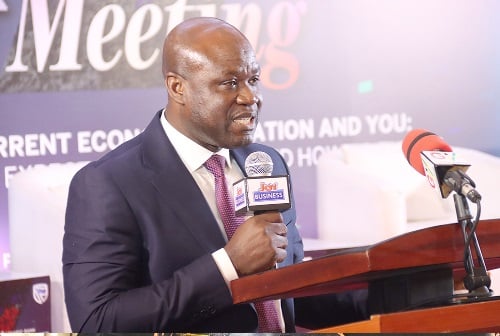In a recent interview with Accra-based Joy News, Mark Badu-Aboagye, the Chief Executive Officer of the Ghana Chamber of Commerce and Industry (GNCCI), articulated significant concerns regarding the prevailing high taxation framework in Ghana. He described the tax regime as “suffocating,” asserting that it is detrimental to the country’s business landscape. According to Badu-Aboagye, the various excise duties and taxes imposed, particularly as a result of Ghana’s bailout program with the International Monetary Fund (IMF), are overly burdensome for companies trying to operate smoothly within the economy. His statements reflect a growing unease among business leaders, who increasingly feel that these financial obligations hinder growth and sustainability.
Badu-Aboagye specifically pointed to the introduction of numerous taxes that have become part of Ghana’s economic landscape post-IMF bailout. He stated that despite the intent behind these fiscal measures, the situation for businesses remains unchanged, often worsening their operating environments. “Nothing has changed,” he asserted, emphasizing the ongoing challenges companies face amidst complex and expensive tax demands. The GNCCI CEO highlighted the e-levy, a particularly contentious tax, which various presidential candidates have vowed to abolish, recognizing it as a “nuisance tax” that fails to meet revenue generation expectations while adversely impacting businesses.
In discussing Ghana’s Value Added Tax (VAT) structure, Badu-Aboagye raised concerns about its complexity. He remarked that the intricate combination of levies associated with VAT is unique to Ghana and poses significant hurdles for businesses trying to comply with regulations. Such a convoluted tax structure, he noted, is not found elsewhere globally and complicates the operations of businesses, making it challenging for them to function efficiently. This complexity could potentially lead to non-compliance, as businesses may struggle to navigate the various tax obligations imposed upon them.
Advocating for reform, Badu-Aboagye proposed that a move towards lower and simpler taxation could yield higher revenue for the government while simultaneously promoting business growth. He argued that high and complex taxes often result in tax evasion or avoidance, as businesses find compliance burdensome. By simplifying the tax code and reducing rates, Badu-Aboagye believes that businesses would be more inclined to comply, ultimately leading to improved revenue for the state. His perspective is rooted in the notion that a thriving business community is essential for a healthy economy.
The GNCCI CEO further stressed the necessity of balancing the government’s need for revenue with the survival of businesses. His comments underscore a crucial dilemma: the government’s financial requirements versus the long-term sustainability of Ghanaian enterprises. Badu-Aboagye’s argument is centered on the idea that affordable and easily understandable taxes will increase compliance among businesses, allowing them to thrive rather than simply survive amidst financial constraints. This balance is critical for fostering an economic environment conducive to growth and innovation.
In summary, Mark Badu-Aboagye’s remarks reveal a pressing concern within Ghana’s business community regarding the current tax regime as detrimental to economic prosperity. His call for lower and simpler taxes reflects a belief that reducing the burden on businesses can lead to increased compliance and, ultimately, better revenue generation for the government. As Ghana seeks to stabilize its economy and support its businesses, the dialogue around tax reform and its implications on business health remains a vital topic on the national agenda.














